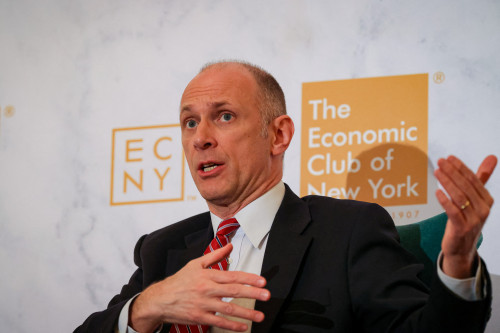(Reuters) -Chicago Federal Reserve President Austan Goolsbee said on Wednesday the U.S. central bank is grappling with understanding whether tariffs will push up inflation just temporarily or more persistently, which would inform its decision on when to cut interest rates.
“As we go into the fall, these are going to be some live meetings and we’re going to have to figure it out,” Goolsbee told the Greater Springfield Chamber of Commerce in Springfield, Illinois. “The hardest thing that a central bank ever has to do is to try to get the timing right when there are moments of transition.”
Goolsbee said he is uneasy assuming tariffs will be just a one-time shock to inflation and wants to see more data including wholesale price data due out this week and broader inflation data next month before coming to a view on whether a rate cut is warranted.
The Fed left its benchmark overnight interest rate in the 4.25%-4.50% range at its meeting last month, a decision that drew dissents from Fed Vice Chair of Supervision Michelle Bowman and Fed Governor Christopher Waller. Bowman and Waller wanted to cut rates to head off what they worried was incipient weakness in the labor market.
Two days after the end of that policy meeting, the U.S. Labor Department revised its earlier estimates of job growth in May and June sharply downward and reported a smaller-than-expected job gain in July. President Donald Trump called the data rigged and fired the commissioner in charge of producing it.
Even so, allies including Treasury Secretary Scott Bessent have seized on the recent jobs report to call for rate cuts that Trump has pushed hard for all year. Some Fed officials also feel the July jobs report bolstered the case for easing policy.
Goolsbee cautioned against reading too much into slowing job growth since that may reflect the sharp drop in immigration. He said he puts more weight on data like the unemployment rate, which at 4.2% is historically low.
“I think the state of the labor market is pretty strong, pretty solid,” Goolsbee said.
Data earlier this week showed consumer prices rose 0.2% on a monthly basis in July, a downshift from the 0.3% reported for the prior month. Goolsbee said he took note of the rise in services inflation, which is not directly related to tariffs, and would be concerned if upcoming data continued to show a broadening of price pressures.
(Reporting by Ann Saphir; Editing by Chris Reese and Paul Simao)


